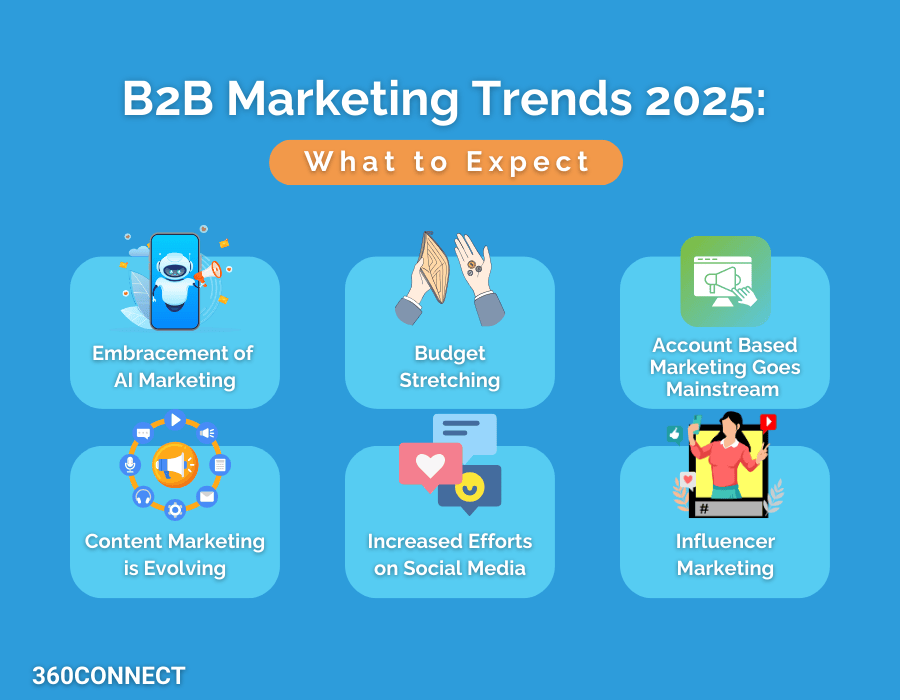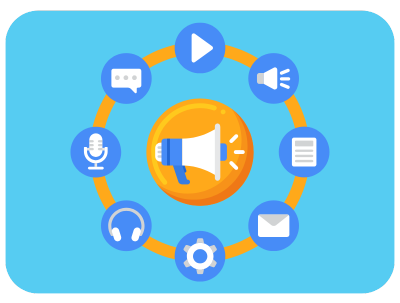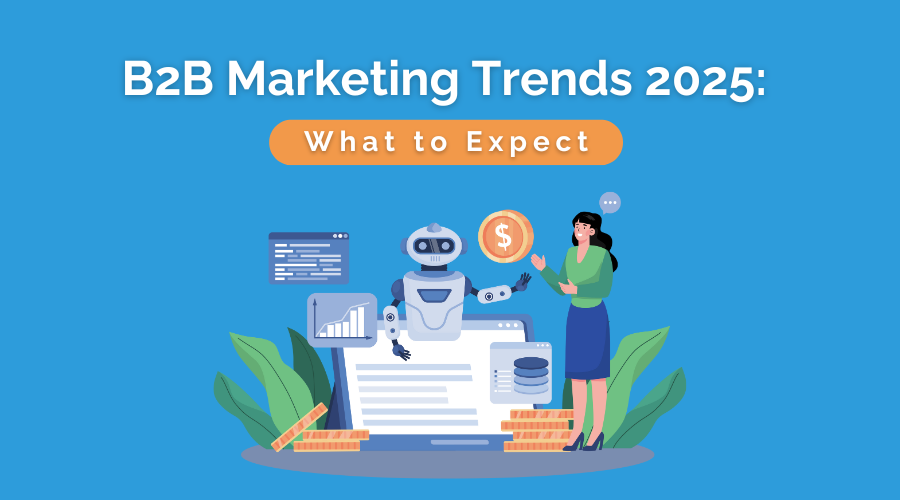As the year winds down and we look toward 2025, it’s the perfect time to start anticipating new B2B marketing trends that could shape your sales strategies for the new year.
Over the past few years, we’ve seen just how quickly the digital landscape can change. Last year we were just mentioning AI as a tool, and now this year it’s already a staple and has advanced to generative AI. With such fast progression, it’s clear that B2B owners, sales managers, and sales team members need to buckle up and be prepared to adapt and plan for whatever 2025 has in store.
B2B owners understand that in an ever-evolving landscape, staying ahead requires more than just awareness—it means adapting and planning for what’s next. Here’s a look at the key B2B marketing trends suppliers should keep on their radar in 2025 to maximize impact and reach in the coming year.
B2B Marketing Trends 2025: What to Expect

Embracing AI: A Key Driver of B2B Marketing Trends in 2025
Artificial intelligence (AI) is no longer an emerging technology—it’s a staple in B2B marketing strategies, helping companies from understanding customer behaviors to optimizing campaigns. In 2025, B2B companies should be leveraging AI tools not just to automate mundane tasks but to analyze data, enhance personalization, and create content that resonates with each target audience segment.
According to a report done by Influencer Marketing Hub, 50.6% of marketers feel AI will have a positive impact on marketing.

For example, AI can help predict which products or services are most relevant to each client, providing insights into hyper-personalized marketing. Consider AI-driven chatbots, predictive analytics, and AI-enhanced ad targeting as essential components of a forward-thinking strategy.
Related: AI Lead Generation: The Future of B2B Sales
Generative AI & Content Marketing
Speaking of AI, we can only expect further advancement of generative AI in 2025, which will be immensely beneficial for content marketing.
Generative AI can create diverse forms of content—ranging from blog posts to product descriptions and even social media captions—in a fraction of the time it would take a human team. This tool empowers B2B companies to maintain a consistent flow of content, keeping audiences engaged without overwhelming internal resources.

In 2025, expect generative AI to become more intuitive, producing content that is not only relevant but also highly personalized. For example, AI tools can craft messages that align with each customer’s stage in the buying journey, from initial interest to post-purchase engagement. This capability to generate audience-specific content allows B2B marketers to connect with clients on a deeper level, building trust and authority while also driving conversions.
Beyond text, generative AI’s capabilities are expanding to include visuals, video scripts, and even audio content. This opens up opportunities for B2B companies to diversify their content strategy and produce media-rich experiences that grab attention and drive engagement. As generative AI tools evolve, they are likely to become key players in shaping how B2B companies tell their brand story, foster relationships, and stand out in a competitive market.
AI Tools You Need to be Using in 2025:
- ChatGPT-4o (Overall)
- Grammarly (Content)
- Wordtune (Content)
- Midjourney (Graphics)
- GitHub Copilot (Coding)
71% of marketers expect generative AI to eliminate busy work and allow them to focus on strategic tasks
Budget Stretching: Adapting to B2B Marketing Trends for Frugal Buyers
With tighter budgets projected for 2025, both B2B suppliers and their buyers are becoming more frugal, making it essential to get the most out of every marketing dollar. For suppliers, this means focusing on strategies that deliver measurable results without breaking the bank. Multi-channel marketing—combining email, content, and social media—will remain a top choice because it maximizes visibility across platforms while keeping costs under control.

Buyers are also watching their budgets closely, so suppliers will need to align their marketing efforts with what customers value most: clear, cost-effective solutions. This could mean using AI to create personalized campaigns that directly address buyer pain points or doubling down on platforms that provide high ROI. In 2025, expect more companies to scrutinize their partnerships with marketing platforms, choosing only those that offer affordable options backed by proven success. The goal? Stretch every dollar while staying top of mind for cost-conscious buyers.
Related: 8 Tips for Selling in Tough Times
Account Based Marketing Goes Mainstream
Account-based marketing (ABM) has shown strong results in recent years, and in 2025, it’s poised to become a mainstream approach for B2B suppliers. By focusing on key accounts, B2B businesses can customize their marketing efforts, fostering deeper connections with high-value clients. This personalized approach allows for tailored messaging, which, in turn, can increase engagement rates. More companies will likely invest in ABM software and dedicated ABM teams to nurture these relationships. If you’re not already utilizing ABM, consider how your company might create targeted campaigns for your most valuable accounts.

Content Marketing is Evolving
Earlier, we briefly mentioned content marketing in relation to AI, but the shift in this space deserves its own spotlight. In 2025, content marketing will continue evolving beyond traditional blogs and whitepapers to meet the changing expectations of buyers.
This means B2B suppliers will need to adopt strategies that go beyond simply creating more content. Video will dominate as a preferred format, with short, impactful clips that clearly communicate key ideas. Interactive tools, like calculators or quizzes, will encourage deeper engagement, while webinars and virtual events will offer a personal touch. The focus will be on making complex ideas accessible and actionable, helping buyers solve problems faster.

Storytelling will also play a bigger role in 2025. Buyers are drawn to brands that not only offer solutions but also connect emotionally by demonstrating how their products or services can drive real success. For B2B suppliers, this means crafting narratives that highlight customer wins and industry leadership.
In short, content marketing is about quality over quantity. Suppliers who focus on delivering content that informs, engages, and inspires will stand out in a competitive landscape.
The average company with a blog produces 67% more leads than the average company without one.
Increased Efforts on Social Media
Social media has grown beyond a mere engagement tool; it’s now a critical channel for B2B lead generation. With platforms like LinkedIn and even TikTok becoming popular for B2B audiences, businesses in 2025 will ramp up efforts to create valuable, shareable content that builds brand awareness and drives conversions. LinkedIn, especially, will continue to dominate, with more B2B companies investing in sponsored posts, live streaming, and influencer partnerships on the platform. Social listening will also play a significant role, allowing businesses to gain insights into customer needs and preferences.

Related: Top 7 Social Media Lead Generation Tips For B2B Sales
Influencer Marketing (No..Really this Time)
Influencer marketing in B2B may sound unconventional, but it’s catching on as businesses recognize the power of industry experts and thought leaders. In 2025, B2B companies will increasingly collaborate with micro and macro influencers who have established authority within niche markets. These influencers can bring credibility, expand reach, and amplify brand messages in an authentic way. Look for ways to engage with influencers who align with your industry values and can help communicate the value of your products or services to a broader audience.

Final Thoughts on B2B Marketing Trends 2025
As we head into 2025, B2B marketing trends are evolving to be more data-driven, targeted, and personal. By embracing these trends, you can position your company ahead of the competition, reaching prospects with strategies tailored to their specific needs. Remember, staying updated on trends isn’t just about adopting the latest technology—it’s about continuously adapting to the needs of your clients year after year.
Stay Ahead with 360Connect
Don’t just read about the future of B2B marketing—start leveraging it. Partner with 360Connect to connect with verified buyers and make 2025 your most successful year yet.

